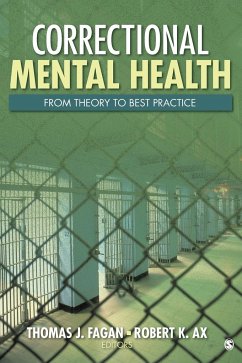- Gebundenes Buch
- Merkliste
- Auf die Merkliste
- Bewerten Bewerten
- Teilen
- Produkt teilen
- Produkterinnerung
- Produkterinnerung
The Correctional Mental Health Handbook is the first book to offer a comprehensive overview of the services provided by correctional mental health professionals for the various populations found in correctional programs and facilities. Edited by Thomas J. Fagan and Robert K. Ax, experts with over 40 years of correctional mental health experience, this unique handbook is divided into three sections. The first section provides a flexible model for organizing mental health services based on staffing levels, facility mission, and local need. The second section considers typical offender problems…mehr
Andere Kunden interessierten sich auch für
![Correctional Mental Health Correctional Mental Health]() Thomas J. FaganCorrectional Mental Health162,99 €
Thomas J. FaganCorrectional Mental Health162,99 €![Choosing Correctional Options That Work Choosing Correctional Options That Work]() Alan T. HarlandChoosing Correctional Options That Work103,99 €
Alan T. HarlandChoosing Correctional Options That Work103,99 €![Choosing Correctional Options That Work Choosing Correctional Options That Work]() Alan T. HarlandChoosing Correctional Options That Work162,99 €
Alan T. HarlandChoosing Correctional Options That Work162,99 €![Correctional Boot Camps Correctional Boot Camps]() Doris L. MacKenzieCorrectional Boot Camps193,99 €
Doris L. MacKenzieCorrectional Boot Camps193,99 €![Correctional Boot Camps Correctional Boot Camps]() Doris L. MacKenzieCorrectional Boot Camps139,99 €
Doris L. MacKenzieCorrectional Boot Camps139,99 €![Racialized Correctional Governance Racialized Correctional Governance]() Claire SpivakovskyRacialized Correctional Governance77,99 €
Claire SpivakovskyRacialized Correctional Governance77,99 €![Practice Innovation in Pollsmoor Correctional Facility Practice Innovation in Pollsmoor Correctional Facility]() Dannyboy PietersePractice Innovation in Pollsmoor Correctional Facility40,99 €
Dannyboy PietersePractice Innovation in Pollsmoor Correctional Facility40,99 €-
-
-
The Correctional Mental Health Handbook is the first book to offer a comprehensive overview of the services provided by correctional mental health professionals for the various populations found in correctional programs and facilities. Edited by Thomas J. Fagan and Robert K. Ax, experts with over 40 years of correctional mental health experience, this unique handbook is divided into three sections. The first section provides a flexible model for organizing mental health services based on staffing levels, facility mission, and local need. The second section considers typical offender problems in many correctional systems and how they are customarily managed. The third section presents various clinical and consultative activities offered by mental health professionals within correctional settings. While the main audience will be correctional mental health professionals and academics involved with training correctional mental health professionals, the Correctional Mental Health Handbook is also an ideal primer for graduate students studying corrections in criminal justice programs. For the student preparing to enter the correctional mental health profession, this indispensable text explains the general characteristics and treatment needs of specific inmate populations including: substance dependent offenders, female offenders, sexual predators, and juvenile offenders.
Hinweis: Dieser Artikel kann nur an eine deutsche Lieferadresse ausgeliefert werden.
Hinweis: Dieser Artikel kann nur an eine deutsche Lieferadresse ausgeliefert werden.
Produktdetails
- Produktdetails
- Verlag: Sage Publications, Inc
- Seitenzahl: 370
- Erscheinungstermin: 2. Dezember 2002
- Englisch
- Abmessung: 260mm x 183mm x 24mm
- Gewicht: 890g
- ISBN-13: 9780761927532
- ISBN-10: 0761927530
- Artikelnr.: 21520101
- Herstellerkennzeichnung
- Books on Demand GmbH
- In de Tarpen 42
- 22848 Norderstedt
- info@bod.de
- 040 53433511
- Verlag: Sage Publications, Inc
- Seitenzahl: 370
- Erscheinungstermin: 2. Dezember 2002
- Englisch
- Abmessung: 260mm x 183mm x 24mm
- Gewicht: 890g
- ISBN-13: 9780761927532
- ISBN-10: 0761927530
- Artikelnr.: 21520101
- Herstellerkennzeichnung
- Books on Demand GmbH
- In de Tarpen 42
- 22848 Norderstedt
- info@bod.de
- 040 53433511
Thomas J. Fagan, Ph.D., is currently an Associate Professor of Psychology and the Director of the Division of Social and Behavioral Science at Nova Southeastern University in Ft. Lauderdale, Florida. For 23 years he was a psychology practitioner and administrator with the Federal Bureau of Prisons where he was an active participant in developing correctional mental health programs, creating mental health policies and procedures, and training professional, paraprofessional, and correctional staff. Dr. Fagan was also the Bureau's Chief hostage negotiator and coordinator of its crisis negotiation training program. Over the years, he has served as a consultant to numerous federal, state, and local law enforcement agencies in the areas of crisis negotiation, critical incident stress debriefing, and management of correctional mental health services and programs. Dr. Fagan has published regularly in correctional and psychological journals, has authored several book chapters, and co-edited two books with Robert K. Ax, Ph.D. -Correctional Mental Health Handbook (2003) and Corrections, Mental Health, and Social Policy: International Perspectives (2007). He also published a book on crisis negotiation in correctional settings - Negotiating Correctional Incidents: A Practical Guide (2003). Since 1997, Dr. Fagan has served as the American Psychological Association (APA)'s representative on the Board of Directors of the National Commission on Correctional Health Care (NCCHC) - a national organization dedicated to insuring quality health and mental health care to incarcerated individuals. He served as NCCHC's Board Chair from 2002 - 2003. He is a Fellow in APA's Divisions 12 and 18. Division 18 recognized his work in correctional mental health with a special achievement award in 1993 and he received APA's Award for Distinguished Contributions to Practice in the Public Sector in 2006. He received is Bachelor's degree from Rutgers University and his Master's and Doctoral Degrees from Virginia Tech.
Introduction
Chapter 1 - Mental Health in Corrections: A Model for Service Delivery -
Thomas J. Fagan
The Mentally Disordered in Prisons and Jails: A Historical Perspective
Metal Illness in Prisons and Jails: Current Status
Mental Health Services in Prisons and Jails: A Conceptual Model
Level One Services
Level Two Services
Level Three Services
Conclusions
Chapter 2 - Correctional Mental Health Professionals - Phil Magaletta and
Jennifer Boothby
Introduction
The Correctional Mental Health Professions
General Professional Considerations
Psychiatrists
Psychologists
Social Workers
Other Mental Health Professionals
Treatment Teams
Paraprofessionals
Mental Health Professionals - Common Correctional Challenges
The Challenge of Limited Knowledge
The Challenge of Limited Resources
The Challenge of Patience in an Action-Oriented Environment
The Challenge of the Joint Mission
Self-Care for Mental Health Professionals
Chapter 3 - Correctional Mental Health Ethics Revisited - John Dignam
The Correctional Context
Treatment vs. Security: A False Dichotomy
Who is the Client?
Who is the Provider?
Ethical Issues
Privacy and Confidentiality
Dual or Multiple Relationships
Clarification of Role
Boundaries of Competence and Maintaining Expertise
Summary and Conclusion
Chapter 4- Basic Mental Health Services: Services and Issues - Robert
Morgan
Typical Mental Health Problems Exhibited By Offenders
Basic Mental Health Services
Assessment
Acute Crisis Intervention
Therapeutic Services
Special Mental Health Evaluations
Mental Health Records
Liability Issues and Basic Mental Health Services
Conclusion
Chapter 5 - Substance Abuse Treatment Programs in Prisons and Jails - Roger
Peters and Charlie Matthews
Current Issues Related to Drug Offenders in Prisons and Jails
Policy Trends Affecting the Incarceration of Substance-Involved Offenders
The Need for Correctional Treatment
History and Scope of Correctional Treatment Services
Standards for Substance Abuse Treatment Services in Prisons and Jails
Legal Standards
Professional Standards
Correctional Substance Abuse Treatment Programs
Federal Bureau of Prisons
Florida Department of Corrections
Oregon Department of Corrections
Correctional Treatment Outcome Research
Treatment Approaches for Special Populations
Co-Occurring Mental Health and Substance Abuse Disorders
Treatment of Female Inmates
Future Directions and Trends in Correctional Substance Abuse Treatment
Linking Correctional and Community Treatment
Expanding Treatment Alternatives to Incarceration
New Directions in Correctional Treatment Research
Chapter 6 - Managing and Treating Mentally Disordered Offenders in Jails
and Prisons - Shelia Holton
Current Issues, Problems, and Trends
Mental Illness: Movement from Hospitals to Prisons and Jails
Obstacles to Effective Treatment in Prisons and Jails
Serious Mental Health Disorders Found In Prisons and Jails: Management and
Treatment Issues
Psychotic Disorders
Mood Disorders
Borderline Personality Disorder
Antisocial Personality Disorder and Psychopathy
Substance Abuse Disorders
Best Practices
Mental Health Treatment Units
Mobile Assessment Teams
Suicide Prevention and Interventions
Telehealth
Future Trends in the Treatment of the Mentally Ill in Corrections
Chapter 7 - Management and Treatment of Female Offenders - Lane Wagaman
Female Offenders: A Brief Historical Overview
Characteristics of Female Offenders
Demographic Data
Responses to Incarceration
Special Management, Treatment and Program Considerations
Utilization of Health and Mental Health Services
Obstetric and Gynecological Needs
Dietary and Nutritional Needs
Sleep Disturbance
Pain and Pain Management
Alcohol and Other Substance Abuse Treatment Needs
Trauma and Abuse
Family Relationship and Parenting Issues
Mental Health Services
Conclusions
Chapter 8 - Treating and Managing Sexual Offenders and Predators - Andrea
Boardman and Dave DeMatteo
Introduction
Legislative Trends
Sexually Violent Predator Laws
Sex Offender Registration and Notification Laws
Internet Child Pornography
Sexual Offenders in Prisons and Jails: Clinical Description
Rapists
Child Molesters
Offender Typologies: A Cautionary Note
Other Sexual Acts
Sexual Offenders in Prisons and Jails: Management Considerations
Sexual Assault in Prison
Sexual Offender Treatment Programs
Sex Offender Treatment Outcome Studies
Best Practices
Future Directions
Chapter 9 - Identifying Juvenile Offenders with Mental Health Disorders -
Lisa Boesky
Introduction
Identification of Juveniles with Mental Health Disorders
Self-Report Information
Family History
Screening and Assessment Instruments
Improving the Accuracy of Self-Reported Information
Collateral Sources of Information
Observation
Behavior or Symptom Checklists
Common Mental Disorders Found Among Juvenile Offenders
Oppositional Defiant Disorder
Attention-Deficit/Hyperactivity Disorder (ADHD)
Conduct Disorder
Major Depression
Dysthymic Disorder
Bipolar Disorder
Suicidal Behavior
Mental Retardation
Learning Disorders
Posttraumatic Stress Disorder (PTSD)
Self-Injury
Psychotic Disorders
Co-Morbidity
Co-Occurring Mental Health and Substance Use Disorders
Cultural Issues
Conclusions
Chapter 10 - Other Special Offender Populations - Linda Richardson
Introduction
Military Offenders
Foreign-Born Offenders
Elderly Offenders
Terminally Ill Offenders
HIV Infected/AIDS Offenders
Offenders with Mental Retardation
Conclusions
Chapter 11 - Staff Services and Programs - Rich Ellis
Employee Assistance Programs: Intervention Models
Stress and Employee Mental Health in the Correctional Environment
In-House Model
Mixed Model
The Independent Model
Other EAP Considerations
Workplace Violence: From the Individual to the Institution
Actual Examples of Correctional Workplace Violence
Responses to Workplace Violence Examples
Other Examples of Workplace Violence
Interventions for Workplace Violence: Defusing and Debriefing
Debriefing: What to do when the workplace goes wrong
The Debriefing Process
Debriefing Procedures and States
The Defusing Process
Conclusions
Chapter 12 - Staff Training: Multiple Roles for Mental Health Professionals
- Kathy Harowski
Overview
Correctional Trends and their Training Implications
Rapid Growth in the Correctional Population
Diversity in Both Offenders and the Workforce
Changing Technology
Training Roles for Mental Health Professionals
Trainer and Audience Issues
Developing Mental Health Paraprofessionals
Training in Particular Skill Areas
Trauma Inoculation/Individual Factors in Coping with Stress
Training the Next Generation of Correctional Mental Health Professionals
Chapter 13 - Mental Health Professionals as Institutional Consultants and
Problem-Solvers - Joel Dvoskin, Erin M. Spiers, and Stephen Pitts
Introduction
Assessing Institutional Climate
Consultation Within The Institution
Classification
Case Management/Unit Teams
Detail/work supervisors
Disciplinary Proceedings
Conflict Resolution
Staff Screening and Selection
Program Development and Evaluation
Crisis: Prevention and Response
Training
Consultation
Post-Incident Response
Mental Health Professionals as Correctional Administrators
Conclusion
Chapter 14 - Research-based Practice in Corrections: A Selective Review -
Carl Clements and Alix McLearen
Introduction
Research Frameworks
The Person-centered Perspective: Offender Characteristics
The Situation-centered Perspective: Policies and Programs
The Interactionist Perspective: Tailored, Selected Interventions
Research in Offender Assessment and Classification
Risk Assessment
Assessment for Treatment
Treatment Outcomes Research
Meta-analysis and Correctional Outcomes
The Role of Theory
Other Evidence of Effective Programs
Research on Special Populations and Issues
Psychopathic Traits as a Special Risk/Needs Factor
Malingering: Detection and Response
Ethical Issues in Correctional Research
Constraints, Recommendations, and Future Issues to Consider
Extending Professional Capacity
Mental Health Professionals as Managers
Commitment to Correctional Research
Implementing Best Practices and Maintaining Therapeutic Integrity
Research with Female Offenders
Research in Jail Settings
Conclusion
Chapter 15 - A Viable Future for Correctional Mental Health Care - Robert
K. Ax
Introduction
Framing the Future
Public Health
Citizens as Consumers
Globalization: American Correctional Mental Health in a Connected World
Building a Viable Future: Changes in Health Care Delivery
Technology
Psychotropic medication
Programming, Assessment and Provider Issues
Staff Issues
Role Transformations: Toward a biopsychosocial scope of practice and
self-concept
Conclusion
About the Authors
Chapter 1 - Mental Health in Corrections: A Model for Service Delivery -
Thomas J. Fagan
The Mentally Disordered in Prisons and Jails: A Historical Perspective
Metal Illness in Prisons and Jails: Current Status
Mental Health Services in Prisons and Jails: A Conceptual Model
Level One Services
Level Two Services
Level Three Services
Conclusions
Chapter 2 - Correctional Mental Health Professionals - Phil Magaletta and
Jennifer Boothby
Introduction
The Correctional Mental Health Professions
General Professional Considerations
Psychiatrists
Psychologists
Social Workers
Other Mental Health Professionals
Treatment Teams
Paraprofessionals
Mental Health Professionals - Common Correctional Challenges
The Challenge of Limited Knowledge
The Challenge of Limited Resources
The Challenge of Patience in an Action-Oriented Environment
The Challenge of the Joint Mission
Self-Care for Mental Health Professionals
Chapter 3 - Correctional Mental Health Ethics Revisited - John Dignam
The Correctional Context
Treatment vs. Security: A False Dichotomy
Who is the Client?
Who is the Provider?
Ethical Issues
Privacy and Confidentiality
Dual or Multiple Relationships
Clarification of Role
Boundaries of Competence and Maintaining Expertise
Summary and Conclusion
Chapter 4- Basic Mental Health Services: Services and Issues - Robert
Morgan
Typical Mental Health Problems Exhibited By Offenders
Basic Mental Health Services
Assessment
Acute Crisis Intervention
Therapeutic Services
Special Mental Health Evaluations
Mental Health Records
Liability Issues and Basic Mental Health Services
Conclusion
Chapter 5 - Substance Abuse Treatment Programs in Prisons and Jails - Roger
Peters and Charlie Matthews
Current Issues Related to Drug Offenders in Prisons and Jails
Policy Trends Affecting the Incarceration of Substance-Involved Offenders
The Need for Correctional Treatment
History and Scope of Correctional Treatment Services
Standards for Substance Abuse Treatment Services in Prisons and Jails
Legal Standards
Professional Standards
Correctional Substance Abuse Treatment Programs
Federal Bureau of Prisons
Florida Department of Corrections
Oregon Department of Corrections
Correctional Treatment Outcome Research
Treatment Approaches for Special Populations
Co-Occurring Mental Health and Substance Abuse Disorders
Treatment of Female Inmates
Future Directions and Trends in Correctional Substance Abuse Treatment
Linking Correctional and Community Treatment
Expanding Treatment Alternatives to Incarceration
New Directions in Correctional Treatment Research
Chapter 6 - Managing and Treating Mentally Disordered Offenders in Jails
and Prisons - Shelia Holton
Current Issues, Problems, and Trends
Mental Illness: Movement from Hospitals to Prisons and Jails
Obstacles to Effective Treatment in Prisons and Jails
Serious Mental Health Disorders Found In Prisons and Jails: Management and
Treatment Issues
Psychotic Disorders
Mood Disorders
Borderline Personality Disorder
Antisocial Personality Disorder and Psychopathy
Substance Abuse Disorders
Best Practices
Mental Health Treatment Units
Mobile Assessment Teams
Suicide Prevention and Interventions
Telehealth
Future Trends in the Treatment of the Mentally Ill in Corrections
Chapter 7 - Management and Treatment of Female Offenders - Lane Wagaman
Female Offenders: A Brief Historical Overview
Characteristics of Female Offenders
Demographic Data
Responses to Incarceration
Special Management, Treatment and Program Considerations
Utilization of Health and Mental Health Services
Obstetric and Gynecological Needs
Dietary and Nutritional Needs
Sleep Disturbance
Pain and Pain Management
Alcohol and Other Substance Abuse Treatment Needs
Trauma and Abuse
Family Relationship and Parenting Issues
Mental Health Services
Conclusions
Chapter 8 - Treating and Managing Sexual Offenders and Predators - Andrea
Boardman and Dave DeMatteo
Introduction
Legislative Trends
Sexually Violent Predator Laws
Sex Offender Registration and Notification Laws
Internet Child Pornography
Sexual Offenders in Prisons and Jails: Clinical Description
Rapists
Child Molesters
Offender Typologies: A Cautionary Note
Other Sexual Acts
Sexual Offenders in Prisons and Jails: Management Considerations
Sexual Assault in Prison
Sexual Offender Treatment Programs
Sex Offender Treatment Outcome Studies
Best Practices
Future Directions
Chapter 9 - Identifying Juvenile Offenders with Mental Health Disorders -
Lisa Boesky
Introduction
Identification of Juveniles with Mental Health Disorders
Self-Report Information
Family History
Screening and Assessment Instruments
Improving the Accuracy of Self-Reported Information
Collateral Sources of Information
Observation
Behavior or Symptom Checklists
Common Mental Disorders Found Among Juvenile Offenders
Oppositional Defiant Disorder
Attention-Deficit/Hyperactivity Disorder (ADHD)
Conduct Disorder
Major Depression
Dysthymic Disorder
Bipolar Disorder
Suicidal Behavior
Mental Retardation
Learning Disorders
Posttraumatic Stress Disorder (PTSD)
Self-Injury
Psychotic Disorders
Co-Morbidity
Co-Occurring Mental Health and Substance Use Disorders
Cultural Issues
Conclusions
Chapter 10 - Other Special Offender Populations - Linda Richardson
Introduction
Military Offenders
Foreign-Born Offenders
Elderly Offenders
Terminally Ill Offenders
HIV Infected/AIDS Offenders
Offenders with Mental Retardation
Conclusions
Chapter 11 - Staff Services and Programs - Rich Ellis
Employee Assistance Programs: Intervention Models
Stress and Employee Mental Health in the Correctional Environment
In-House Model
Mixed Model
The Independent Model
Other EAP Considerations
Workplace Violence: From the Individual to the Institution
Actual Examples of Correctional Workplace Violence
Responses to Workplace Violence Examples
Other Examples of Workplace Violence
Interventions for Workplace Violence: Defusing and Debriefing
Debriefing: What to do when the workplace goes wrong
The Debriefing Process
Debriefing Procedures and States
The Defusing Process
Conclusions
Chapter 12 - Staff Training: Multiple Roles for Mental Health Professionals
- Kathy Harowski
Overview
Correctional Trends and their Training Implications
Rapid Growth in the Correctional Population
Diversity in Both Offenders and the Workforce
Changing Technology
Training Roles for Mental Health Professionals
Trainer and Audience Issues
Developing Mental Health Paraprofessionals
Training in Particular Skill Areas
Trauma Inoculation/Individual Factors in Coping with Stress
Training the Next Generation of Correctional Mental Health Professionals
Chapter 13 - Mental Health Professionals as Institutional Consultants and
Problem-Solvers - Joel Dvoskin, Erin M. Spiers, and Stephen Pitts
Introduction
Assessing Institutional Climate
Consultation Within The Institution
Classification
Case Management/Unit Teams
Detail/work supervisors
Disciplinary Proceedings
Conflict Resolution
Staff Screening and Selection
Program Development and Evaluation
Crisis: Prevention and Response
Training
Consultation
Post-Incident Response
Mental Health Professionals as Correctional Administrators
Conclusion
Chapter 14 - Research-based Practice in Corrections: A Selective Review -
Carl Clements and Alix McLearen
Introduction
Research Frameworks
The Person-centered Perspective: Offender Characteristics
The Situation-centered Perspective: Policies and Programs
The Interactionist Perspective: Tailored, Selected Interventions
Research in Offender Assessment and Classification
Risk Assessment
Assessment for Treatment
Treatment Outcomes Research
Meta-analysis and Correctional Outcomes
The Role of Theory
Other Evidence of Effective Programs
Research on Special Populations and Issues
Psychopathic Traits as a Special Risk/Needs Factor
Malingering: Detection and Response
Ethical Issues in Correctional Research
Constraints, Recommendations, and Future Issues to Consider
Extending Professional Capacity
Mental Health Professionals as Managers
Commitment to Correctional Research
Implementing Best Practices and Maintaining Therapeutic Integrity
Research with Female Offenders
Research in Jail Settings
Conclusion
Chapter 15 - A Viable Future for Correctional Mental Health Care - Robert
K. Ax
Introduction
Framing the Future
Public Health
Citizens as Consumers
Globalization: American Correctional Mental Health in a Connected World
Building a Viable Future: Changes in Health Care Delivery
Technology
Psychotropic medication
Programming, Assessment and Provider Issues
Staff Issues
Role Transformations: Toward a biopsychosocial scope of practice and
self-concept
Conclusion
About the Authors
Introduction
Chapter 1 - Mental Health in Corrections: A Model for Service Delivery -
Thomas J. Fagan
The Mentally Disordered in Prisons and Jails: A Historical Perspective
Metal Illness in Prisons and Jails: Current Status
Mental Health Services in Prisons and Jails: A Conceptual Model
Level One Services
Level Two Services
Level Three Services
Conclusions
Chapter 2 - Correctional Mental Health Professionals - Phil Magaletta and
Jennifer Boothby
Introduction
The Correctional Mental Health Professions
General Professional Considerations
Psychiatrists
Psychologists
Social Workers
Other Mental Health Professionals
Treatment Teams
Paraprofessionals
Mental Health Professionals - Common Correctional Challenges
The Challenge of Limited Knowledge
The Challenge of Limited Resources
The Challenge of Patience in an Action-Oriented Environment
The Challenge of the Joint Mission
Self-Care for Mental Health Professionals
Chapter 3 - Correctional Mental Health Ethics Revisited - John Dignam
The Correctional Context
Treatment vs. Security: A False Dichotomy
Who is the Client?
Who is the Provider?
Ethical Issues
Privacy and Confidentiality
Dual or Multiple Relationships
Clarification of Role
Boundaries of Competence and Maintaining Expertise
Summary and Conclusion
Chapter 4- Basic Mental Health Services: Services and Issues - Robert
Morgan
Typical Mental Health Problems Exhibited By Offenders
Basic Mental Health Services
Assessment
Acute Crisis Intervention
Therapeutic Services
Special Mental Health Evaluations
Mental Health Records
Liability Issues and Basic Mental Health Services
Conclusion
Chapter 5 - Substance Abuse Treatment Programs in Prisons and Jails - Roger
Peters and Charlie Matthews
Current Issues Related to Drug Offenders in Prisons and Jails
Policy Trends Affecting the Incarceration of Substance-Involved Offenders
The Need for Correctional Treatment
History and Scope of Correctional Treatment Services
Standards for Substance Abuse Treatment Services in Prisons and Jails
Legal Standards
Professional Standards
Correctional Substance Abuse Treatment Programs
Federal Bureau of Prisons
Florida Department of Corrections
Oregon Department of Corrections
Correctional Treatment Outcome Research
Treatment Approaches for Special Populations
Co-Occurring Mental Health and Substance Abuse Disorders
Treatment of Female Inmates
Future Directions and Trends in Correctional Substance Abuse Treatment
Linking Correctional and Community Treatment
Expanding Treatment Alternatives to Incarceration
New Directions in Correctional Treatment Research
Chapter 6 - Managing and Treating Mentally Disordered Offenders in Jails
and Prisons - Shelia Holton
Current Issues, Problems, and Trends
Mental Illness: Movement from Hospitals to Prisons and Jails
Obstacles to Effective Treatment in Prisons and Jails
Serious Mental Health Disorders Found In Prisons and Jails: Management and
Treatment Issues
Psychotic Disorders
Mood Disorders
Borderline Personality Disorder
Antisocial Personality Disorder and Psychopathy
Substance Abuse Disorders
Best Practices
Mental Health Treatment Units
Mobile Assessment Teams
Suicide Prevention and Interventions
Telehealth
Future Trends in the Treatment of the Mentally Ill in Corrections
Chapter 7 - Management and Treatment of Female Offenders - Lane Wagaman
Female Offenders: A Brief Historical Overview
Characteristics of Female Offenders
Demographic Data
Responses to Incarceration
Special Management, Treatment and Program Considerations
Utilization of Health and Mental Health Services
Obstetric and Gynecological Needs
Dietary and Nutritional Needs
Sleep Disturbance
Pain and Pain Management
Alcohol and Other Substance Abuse Treatment Needs
Trauma and Abuse
Family Relationship and Parenting Issues
Mental Health Services
Conclusions
Chapter 8 - Treating and Managing Sexual Offenders and Predators - Andrea
Boardman and Dave DeMatteo
Introduction
Legislative Trends
Sexually Violent Predator Laws
Sex Offender Registration and Notification Laws
Internet Child Pornography
Sexual Offenders in Prisons and Jails: Clinical Description
Rapists
Child Molesters
Offender Typologies: A Cautionary Note
Other Sexual Acts
Sexual Offenders in Prisons and Jails: Management Considerations
Sexual Assault in Prison
Sexual Offender Treatment Programs
Sex Offender Treatment Outcome Studies
Best Practices
Future Directions
Chapter 9 - Identifying Juvenile Offenders with Mental Health Disorders -
Lisa Boesky
Introduction
Identification of Juveniles with Mental Health Disorders
Self-Report Information
Family History
Screening and Assessment Instruments
Improving the Accuracy of Self-Reported Information
Collateral Sources of Information
Observation
Behavior or Symptom Checklists
Common Mental Disorders Found Among Juvenile Offenders
Oppositional Defiant Disorder
Attention-Deficit/Hyperactivity Disorder (ADHD)
Conduct Disorder
Major Depression
Dysthymic Disorder
Bipolar Disorder
Suicidal Behavior
Mental Retardation
Learning Disorders
Posttraumatic Stress Disorder (PTSD)
Self-Injury
Psychotic Disorders
Co-Morbidity
Co-Occurring Mental Health and Substance Use Disorders
Cultural Issues
Conclusions
Chapter 10 - Other Special Offender Populations - Linda Richardson
Introduction
Military Offenders
Foreign-Born Offenders
Elderly Offenders
Terminally Ill Offenders
HIV Infected/AIDS Offenders
Offenders with Mental Retardation
Conclusions
Chapter 11 - Staff Services and Programs - Rich Ellis
Employee Assistance Programs: Intervention Models
Stress and Employee Mental Health in the Correctional Environment
In-House Model
Mixed Model
The Independent Model
Other EAP Considerations
Workplace Violence: From the Individual to the Institution
Actual Examples of Correctional Workplace Violence
Responses to Workplace Violence Examples
Other Examples of Workplace Violence
Interventions for Workplace Violence: Defusing and Debriefing
Debriefing: What to do when the workplace goes wrong
The Debriefing Process
Debriefing Procedures and States
The Defusing Process
Conclusions
Chapter 12 - Staff Training: Multiple Roles for Mental Health Professionals
- Kathy Harowski
Overview
Correctional Trends and their Training Implications
Rapid Growth in the Correctional Population
Diversity in Both Offenders and the Workforce
Changing Technology
Training Roles for Mental Health Professionals
Trainer and Audience Issues
Developing Mental Health Paraprofessionals
Training in Particular Skill Areas
Trauma Inoculation/Individual Factors in Coping with Stress
Training the Next Generation of Correctional Mental Health Professionals
Chapter 13 - Mental Health Professionals as Institutional Consultants and
Problem-Solvers - Joel Dvoskin, Erin M. Spiers, and Stephen Pitts
Introduction
Assessing Institutional Climate
Consultation Within The Institution
Classification
Case Management/Unit Teams
Detail/work supervisors
Disciplinary Proceedings
Conflict Resolution
Staff Screening and Selection
Program Development and Evaluation
Crisis: Prevention and Response
Training
Consultation
Post-Incident Response
Mental Health Professionals as Correctional Administrators
Conclusion
Chapter 14 - Research-based Practice in Corrections: A Selective Review -
Carl Clements and Alix McLearen
Introduction
Research Frameworks
The Person-centered Perspective: Offender Characteristics
The Situation-centered Perspective: Policies and Programs
The Interactionist Perspective: Tailored, Selected Interventions
Research in Offender Assessment and Classification
Risk Assessment
Assessment for Treatment
Treatment Outcomes Research
Meta-analysis and Correctional Outcomes
The Role of Theory
Other Evidence of Effective Programs
Research on Special Populations and Issues
Psychopathic Traits as a Special Risk/Needs Factor
Malingering: Detection and Response
Ethical Issues in Correctional Research
Constraints, Recommendations, and Future Issues to Consider
Extending Professional Capacity
Mental Health Professionals as Managers
Commitment to Correctional Research
Implementing Best Practices and Maintaining Therapeutic Integrity
Research with Female Offenders
Research in Jail Settings
Conclusion
Chapter 15 - A Viable Future for Correctional Mental Health Care - Robert
K. Ax
Introduction
Framing the Future
Public Health
Citizens as Consumers
Globalization: American Correctional Mental Health in a Connected World
Building a Viable Future: Changes in Health Care Delivery
Technology
Psychotropic medication
Programming, Assessment and Provider Issues
Staff Issues
Role Transformations: Toward a biopsychosocial scope of practice and
self-concept
Conclusion
About the Authors
Chapter 1 - Mental Health in Corrections: A Model for Service Delivery -
Thomas J. Fagan
The Mentally Disordered in Prisons and Jails: A Historical Perspective
Metal Illness in Prisons and Jails: Current Status
Mental Health Services in Prisons and Jails: A Conceptual Model
Level One Services
Level Two Services
Level Three Services
Conclusions
Chapter 2 - Correctional Mental Health Professionals - Phil Magaletta and
Jennifer Boothby
Introduction
The Correctional Mental Health Professions
General Professional Considerations
Psychiatrists
Psychologists
Social Workers
Other Mental Health Professionals
Treatment Teams
Paraprofessionals
Mental Health Professionals - Common Correctional Challenges
The Challenge of Limited Knowledge
The Challenge of Limited Resources
The Challenge of Patience in an Action-Oriented Environment
The Challenge of the Joint Mission
Self-Care for Mental Health Professionals
Chapter 3 - Correctional Mental Health Ethics Revisited - John Dignam
The Correctional Context
Treatment vs. Security: A False Dichotomy
Who is the Client?
Who is the Provider?
Ethical Issues
Privacy and Confidentiality
Dual or Multiple Relationships
Clarification of Role
Boundaries of Competence and Maintaining Expertise
Summary and Conclusion
Chapter 4- Basic Mental Health Services: Services and Issues - Robert
Morgan
Typical Mental Health Problems Exhibited By Offenders
Basic Mental Health Services
Assessment
Acute Crisis Intervention
Therapeutic Services
Special Mental Health Evaluations
Mental Health Records
Liability Issues and Basic Mental Health Services
Conclusion
Chapter 5 - Substance Abuse Treatment Programs in Prisons and Jails - Roger
Peters and Charlie Matthews
Current Issues Related to Drug Offenders in Prisons and Jails
Policy Trends Affecting the Incarceration of Substance-Involved Offenders
The Need for Correctional Treatment
History and Scope of Correctional Treatment Services
Standards for Substance Abuse Treatment Services in Prisons and Jails
Legal Standards
Professional Standards
Correctional Substance Abuse Treatment Programs
Federal Bureau of Prisons
Florida Department of Corrections
Oregon Department of Corrections
Correctional Treatment Outcome Research
Treatment Approaches for Special Populations
Co-Occurring Mental Health and Substance Abuse Disorders
Treatment of Female Inmates
Future Directions and Trends in Correctional Substance Abuse Treatment
Linking Correctional and Community Treatment
Expanding Treatment Alternatives to Incarceration
New Directions in Correctional Treatment Research
Chapter 6 - Managing and Treating Mentally Disordered Offenders in Jails
and Prisons - Shelia Holton
Current Issues, Problems, and Trends
Mental Illness: Movement from Hospitals to Prisons and Jails
Obstacles to Effective Treatment in Prisons and Jails
Serious Mental Health Disorders Found In Prisons and Jails: Management and
Treatment Issues
Psychotic Disorders
Mood Disorders
Borderline Personality Disorder
Antisocial Personality Disorder and Psychopathy
Substance Abuse Disorders
Best Practices
Mental Health Treatment Units
Mobile Assessment Teams
Suicide Prevention and Interventions
Telehealth
Future Trends in the Treatment of the Mentally Ill in Corrections
Chapter 7 - Management and Treatment of Female Offenders - Lane Wagaman
Female Offenders: A Brief Historical Overview
Characteristics of Female Offenders
Demographic Data
Responses to Incarceration
Special Management, Treatment and Program Considerations
Utilization of Health and Mental Health Services
Obstetric and Gynecological Needs
Dietary and Nutritional Needs
Sleep Disturbance
Pain and Pain Management
Alcohol and Other Substance Abuse Treatment Needs
Trauma and Abuse
Family Relationship and Parenting Issues
Mental Health Services
Conclusions
Chapter 8 - Treating and Managing Sexual Offenders and Predators - Andrea
Boardman and Dave DeMatteo
Introduction
Legislative Trends
Sexually Violent Predator Laws
Sex Offender Registration and Notification Laws
Internet Child Pornography
Sexual Offenders in Prisons and Jails: Clinical Description
Rapists
Child Molesters
Offender Typologies: A Cautionary Note
Other Sexual Acts
Sexual Offenders in Prisons and Jails: Management Considerations
Sexual Assault in Prison
Sexual Offender Treatment Programs
Sex Offender Treatment Outcome Studies
Best Practices
Future Directions
Chapter 9 - Identifying Juvenile Offenders with Mental Health Disorders -
Lisa Boesky
Introduction
Identification of Juveniles with Mental Health Disorders
Self-Report Information
Family History
Screening and Assessment Instruments
Improving the Accuracy of Self-Reported Information
Collateral Sources of Information
Observation
Behavior or Symptom Checklists
Common Mental Disorders Found Among Juvenile Offenders
Oppositional Defiant Disorder
Attention-Deficit/Hyperactivity Disorder (ADHD)
Conduct Disorder
Major Depression
Dysthymic Disorder
Bipolar Disorder
Suicidal Behavior
Mental Retardation
Learning Disorders
Posttraumatic Stress Disorder (PTSD)
Self-Injury
Psychotic Disorders
Co-Morbidity
Co-Occurring Mental Health and Substance Use Disorders
Cultural Issues
Conclusions
Chapter 10 - Other Special Offender Populations - Linda Richardson
Introduction
Military Offenders
Foreign-Born Offenders
Elderly Offenders
Terminally Ill Offenders
HIV Infected/AIDS Offenders
Offenders with Mental Retardation
Conclusions
Chapter 11 - Staff Services and Programs - Rich Ellis
Employee Assistance Programs: Intervention Models
Stress and Employee Mental Health in the Correctional Environment
In-House Model
Mixed Model
The Independent Model
Other EAP Considerations
Workplace Violence: From the Individual to the Institution
Actual Examples of Correctional Workplace Violence
Responses to Workplace Violence Examples
Other Examples of Workplace Violence
Interventions for Workplace Violence: Defusing and Debriefing
Debriefing: What to do when the workplace goes wrong
The Debriefing Process
Debriefing Procedures and States
The Defusing Process
Conclusions
Chapter 12 - Staff Training: Multiple Roles for Mental Health Professionals
- Kathy Harowski
Overview
Correctional Trends and their Training Implications
Rapid Growth in the Correctional Population
Diversity in Both Offenders and the Workforce
Changing Technology
Training Roles for Mental Health Professionals
Trainer and Audience Issues
Developing Mental Health Paraprofessionals
Training in Particular Skill Areas
Trauma Inoculation/Individual Factors in Coping with Stress
Training the Next Generation of Correctional Mental Health Professionals
Chapter 13 - Mental Health Professionals as Institutional Consultants and
Problem-Solvers - Joel Dvoskin, Erin M. Spiers, and Stephen Pitts
Introduction
Assessing Institutional Climate
Consultation Within The Institution
Classification
Case Management/Unit Teams
Detail/work supervisors
Disciplinary Proceedings
Conflict Resolution
Staff Screening and Selection
Program Development and Evaluation
Crisis: Prevention and Response
Training
Consultation
Post-Incident Response
Mental Health Professionals as Correctional Administrators
Conclusion
Chapter 14 - Research-based Practice in Corrections: A Selective Review -
Carl Clements and Alix McLearen
Introduction
Research Frameworks
The Person-centered Perspective: Offender Characteristics
The Situation-centered Perspective: Policies and Programs
The Interactionist Perspective: Tailored, Selected Interventions
Research in Offender Assessment and Classification
Risk Assessment
Assessment for Treatment
Treatment Outcomes Research
Meta-analysis and Correctional Outcomes
The Role of Theory
Other Evidence of Effective Programs
Research on Special Populations and Issues
Psychopathic Traits as a Special Risk/Needs Factor
Malingering: Detection and Response
Ethical Issues in Correctional Research
Constraints, Recommendations, and Future Issues to Consider
Extending Professional Capacity
Mental Health Professionals as Managers
Commitment to Correctional Research
Implementing Best Practices and Maintaining Therapeutic Integrity
Research with Female Offenders
Research in Jail Settings
Conclusion
Chapter 15 - A Viable Future for Correctional Mental Health Care - Robert
K. Ax
Introduction
Framing the Future
Public Health
Citizens as Consumers
Globalization: American Correctional Mental Health in a Connected World
Building a Viable Future: Changes in Health Care Delivery
Technology
Psychotropic medication
Programming, Assessment and Provider Issues
Staff Issues
Role Transformations: Toward a biopsychosocial scope of practice and
self-concept
Conclusion
About the Authors








